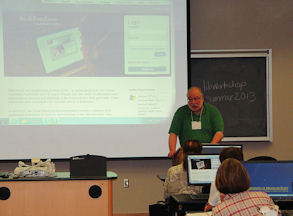UM-Flint Workshop Hosts Specialists in Holocaust Research
This week, the University of Michigan-Flint is making available for Michigan teachers who teach the Holocaust a rare opportunity to attend a week-long workshop that combines scholarship, cutting edge research technology, and innovative teaching techniques using video testimonies.

The workshop feature specialists in Holocaust research, including Michigan State University professor and former UM-Flint Winegarden visiting professor Ken Waltzer, Ph.D. Representatives from the other two U-M campuses are also participating. They include Professor Hank Greenspan of U-M Ann Arbor, and Jamie Wraight, director of UM-Dearborn's Voice/Visions Archive. The University of Southern California Shoah Archive Curator Crispin Brooks is also doing a presentation for the workshop. The Shoah Foundation Visual History Archive is the largest Holocaust testimony archive in existence today. Testimonies in the archive will be accessed online through UM-Flint's Frances Willson Thompson Library website.
Workshop participants include K-12 educators, community and 4-year college faculty, graduate students, librarians, and education resource/curriculum specialists.
Participants received reading packets in advance of the workshop, as well as a copy of On Listening to Holocaust Survivors (2nd ed.).
The workshop will focus on, among other things:
– Information literacy and critical skills in teaching with or research based on Holocaust survivor video testimonies online at Shoah Visual History Archive, University of Southern California, and Voices/Visions testimonies, online at University of Michigan-Dearborn.
– Working with digital testimony resources as texts and sources for doing history.
"This workshop is an extraordinary opportunity to develop critical skills for teaching or research using video testimonies online at Shoah Visual History Archive, and the Voices/Visions testimonies at University of Michigan-Dearborn," said conference coordinator Theodosia Robertson, Ph.D. "Educators can explore the dynamics of a digital testimony classroom, and graduate students can practice using digital testimony as texts and sources for doing history."
Workshop sessions are being held at the Frances Willson Thompson Library, a state-of-the-art facility for online research and instruction.
Related Posts
No related photos.
UM-Flint News
The Office of Marketing & Communications can be reached at [email protected].
